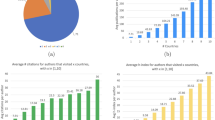Abstract
This paper explores the mobility of the highly educated young Greek scholars. This is made possible through a bibliometric analysis of the affiliation countries of scholars who have published in peer reviewed journals indexed in Scopus. Approximately half of the researchers are identified from publications covered in Scopus for the period 2000–2019. A general taxonomy model is followed for analysing scientific mobility using affiliation changes. The greatest share of researchers (78.3%) appear to be static (74.6% in Greece and 3.7% abroad), whereas the mobile researcher category (21.7%) is divided into migrants (8.9%)—researchers who have left their country of origin—and travellers (12.8%)—researchers who gain additional affiliations while maintaining affiliation with their country of origin. According to the findings, the majority and especially the researcher elite (90.5%) did not sever ties with their country of origin, Greece, but instead built a chain of affiliations that linked nations together. Such chains are represented as groups of countries (clusters), in which the scientific connections between different countries can be visualised. It can be reasoned that the majority of researchers (70.3%) have a tendency to publish to a group of countries with ‘traditionally’ significant scientific impact.








Similar content being viewed by others
References
Armijo-Olivo, S., et al. (2012). Assessment of study quality for systematic reviews: A comparison of the cochrane collaboration risk of bias tool and the effective public health practice project quality assessment tool: Methodological research. Journal of Evaluation in Clinical Practice, 18(1), 12–18.
Chalamandaris, A., et al. (2006). All Greek to me! An automatic Greeklish to Greek transliteration system. In LREC (pp. 1226–1229).
Falagas, M. E., et al. (2008). Comparison of SCImago journal rank indicator with journal impact factor. The FASEB Journal, 22(8), 2623–2628.
Gibson, J., & McKenzie, D. (2014). Scientific mobility and knowledge networks in high emigration countries: Evidence from the Pacific. Research Policy, 43(9), 1486–1495.
Karakos, A. (2003). Greeklish: An experimental interface for automatic transliteration. Journal of the American Society for Information Science and Technology, 54(11), 1069–1074.
Laudel, G. (2003). Studying the brain drain: Can bibliometric methods help? Scientometrics, 57(2), 215–237.
Moed, H. F., & Halevi, G. (2014). A bibliometric approach to tracking international scientific migration. Scientometrics, 101(3), 1987–2001.
Newman, M. E. J., & Girvan, M. (2004). Finding and evaluating community structure in networks. Physical Review, E69(2), 026113.
Robinson-Garcia, N., et al. (2019). The many faces of mobility: Using bibliometric data to measure the movement of scientists. Journal of Informetrics, 13(1), 50–63.
Sheller, M., & Urry, J. (2006). The new mobilities paradigm. Environment and Planning A, 38(2), 207–226.
Sugimoto, C. R., et al. (2017). Scientists have most impact when they’re free to move. Nature News, 550(7674), 29.
Van Eck, N. J., & Waltman, L. (2014). Visualizing bibliometric net-works. In Measuring scholarly impact (pp. 285–320). Springer.
Van Eck, N. J. (2019). VOSviewer manual version 1.6.13. Leiden: University Leiden.
van Eck, N. J., & Waltman, L. (2009). How to normalize cooccurrence data? An analysis of some well-known similarity measures. Journal of the American Society for Information Science and Technology, 60(8), 1635–1651.
Van Eck, N. J., Waltman, L., et al. (2010). A comparison of two techniques for bibliometric mapping: Multidimensional scaling and VOS. Journal of the American Society for Information Science and Technology, 61(12), 2405–2416.
Waltman, L., & Eck, N. J. V. (2013). A smart local moving algorithm for large-scale modularity-based community detection. The European Physical Journal B, 86(11), 471.
Waltman, L., Eck, N. J. V., & Noyons, E. C. M. (2010). A unified approach to mapping and clustering of bibliometric networks. Journal of Informetrics, 4(4), 629–635.
Waltman, L., & Noyons, E. (2018). Bibliometric and research management and research evaluation. A brief introduction. Amsterdam: Universiteit Leiden.
Author information
Authors and Affiliations
Corresponding author
Rights and permissions
About this article
Cite this article
Sachini, E., Karampekios, N., Brutti, P. et al. Should I stay or should I go? Using bibliometrics to identify the international mobility of highly educated Greek manpower. Scientometrics 125, 641–663 (2020). https://doi.org/10.1007/s11192-020-03618-y
Received:
Published:
Issue Date:
DOI: https://doi.org/10.1007/s11192-020-03618-y




